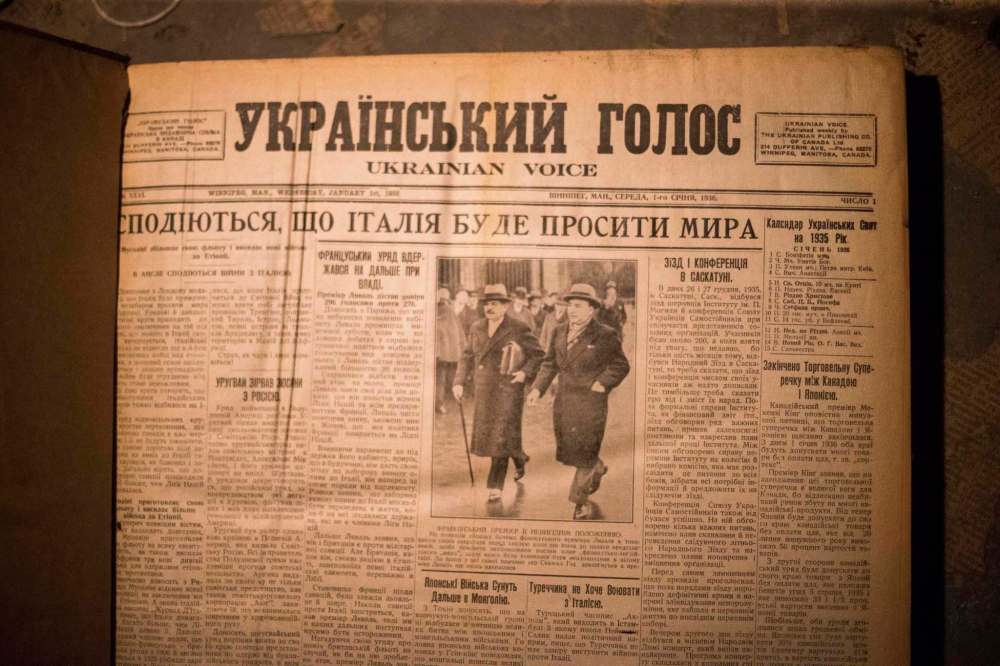The Ukrainian heart beats strong
Advertisement
Read this article for free:
or
Already have an account? Log in here »
To continue reading, please subscribe:
Monthly Digital Subscription
$0 for the first 4 weeks*
- Enjoy unlimited reading on winnipegfreepress.com
- Read the E-Edition, our digital replica newspaper
- Access News Break, our award-winning app
- Play interactive puzzles
*No charge for 4 weeks then price increases to the regular rate of $19.00 plus GST every four weeks. Offer available to new and qualified returning subscribers only. Cancel any time.
Monthly Digital Subscription
$4.75/week*
- Enjoy unlimited reading on winnipegfreepress.com
- Read the E-Edition, our digital replica newspaper
- Access News Break, our award-winning app
- Play interactive puzzles
*Billed as $19 plus GST every four weeks. Cancel any time.
To continue reading, please subscribe:
Add Free Press access to your Brandon Sun subscription for only an additional
$1 for the first 4 weeks*
*Your next subscription payment will increase by $1.00 and you will be charged $16.99 plus GST for four weeks. After four weeks, your payment will increase to $23.99 plus GST every four weeks.
Read unlimited articles for free today:
or
Already have an account? Log in here »
Hey there, time traveller!
This article was published 21/08/2018 (2671 days ago), so information in it may no longer be current.
It was with sadness that I read Alexandra Paul’s article Going Silent on the closure of the Ukrainian Voice (Holos) newspaper this month after 110 years in print. My dido (grandfather) Mykola Hnatiw worked for the newspaper in its print shop on Main and Dufferin for many years. I remember going to visit him there in the 1980s, in the printing press room full of enormous, loud machines, the air heavy with the smell of cigarette smoke and intense political discussions.
As Paul noted in her article, the newspaper was started in 1910 by a group of Ukrainian teachers to unite Ukrainian immigrants and became a leading advocate for Ukrainians in Canada. From that perspective, the closure of the newspaper represents a sad day of reckoning, a loss for our community and a sign of troubling times.
While Canada’s Ukrainian community is changing, it continues to grow and flourish. Recent census data shows that nearly 1.4 million Canadians identify as Ukrainian Canadians, more than ever before. Ukrainian community life flourishes in traditional heartland in Canada’s West, combined with new immigrants who are more likely to settle in places like Vancouver or New Brunswick.

Our work at the Ukrainian Canadian Congress (UCC) brings us in touch with Ukrainian communities across Canada. The desire to be well informed about local issues and the challenges facing Ukraine remains strong. There are certainly changes in the use of the Ukrainian language, but here again there are signs of light, such as a new Ukrainian-language school in Morden which opened last year or new Ukrainian stores and restaurants in Brandon. For our part, the UCC is working with researchers to learn more about the changing nature of our community so we can serve it more effectively.
Our community media remains one of the few sources of coverage of community events and news from Ukraine, as I’m sure it is for other ethnocultural communities. Canada is home to two national current-events Ukrainian-language television programs, numerous radio broadcasts, podcasts, magazines and newspapers, which points to a changing media landscape related to how readers access information. Of course, social media has become an important method for our community to stay connected in Canada and internationally.
It’s unfortunate that in an era of cuts to newsroom budgets we have less in-depth coverage of international events. I believe Canadians deserve to see more coverage about the growing free-trade relationship between Canada and Ukraine. They should be reading about the successful military co-operation and the important international assistance which Canada provides in Ukraine and around the world.
Most importantly, we don’t see regular coverage of Russia’s war against Ukraine, in which Ukraine’s soldiers die every day. Neither do the terrible human rights abuses perpetrated by the the Russian occupying regime in Crimea and Eastern Ukraine receive nearly enough coverage.
Many books have been written about the contributions, experiences and impact of Ukrainians in Canada.
Having survived racist discrimination experienced by the first immigrants in 1891, the internment operations of the First World War and the struggle for multiculturalism of the 1960s and ’70s, Ukrainian Canadians can now count themselves in the ranks of influential political, business and cultural leaders.
My grandfather was proud of his work with the Ukrainian Voice, which he and his generation saw as the vehicle to inform and unite a diaspora yearning for freedom in their homeland. In my lifetime, the demand for news from Ukraine grew with the pace of historical events, such as the Orange Revolution in 2004, the 2014 Revolution of Dignity and now Russia’s ongoing war of aggression against Ukraine.
The print presses will go silent at Ukrainian Voice, but the pulse of the community continues to beat strongly thanks to the hard work of a pioneering generation.
Ihor Michalchyshyn is CEO of the Ukrainian Canadian Congress in Ottawa, but remains a proud Winnipegger.


